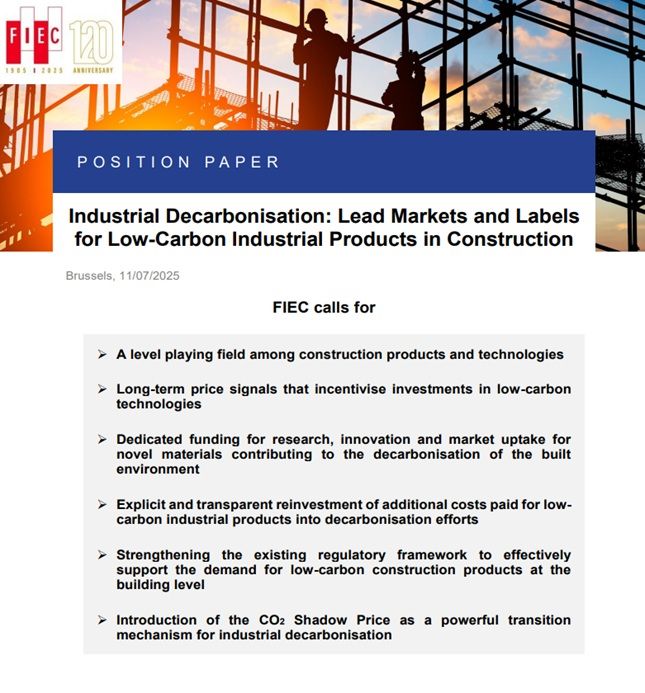


On 11 July, FIEC published its Position Paper "Industrial Decarbonisation: Lead Markets and Labels for Low-Carbon Industrial Products in Construction". The document highlights specific policy proposals to achieve an efficient and cost-effective decarbonisation of industrial products in the construction sector value chain.
The European Commission is currently drafting a legislative proposal, namely the Industrial Decarbonisation Accelerator Act (IDAA), in the context of the EU Clean Industrial Deal. It will address industrial decarbonisation, access to energy, and aims to support the creation of lead markets to foster European clean and resilient industrial technologies and products. Of particular importance to the European construction industry is the intended development of product labels for industrial products.
FIEC welcomes the overall objective of the planned IDAA to increase sustainable and resilient production in energy-intensive industrial sectors in the EU by supporting decarbonisation investments. For SMEs, which are the backbone of the EU construction sector, it is crucial that future instruments are practical, cost-effective, and low in administrative burden. CO2 emissions of the construction sector are estimated at 5-12% of total national greenhouse gas (GHG) emissions, and the vast majority of those are primarily linked to material extraction and production, which makes greater material efficiency and a focus on reducing the carbon footprint of construction products key. As public procurement accounts for 14% of EU GDP, we agree that related policies might potentially be a powerful instrument to help overcome barriers to market entry and to support sustainable and resilient industrial ecosystems, jobs and value creation in the EU. The voluntary label on the carbon intensity of industrial products, developed by the IDAA, might be introduced as a mandatory non-price criterion for sustainability during the revision of the Public Procurement Directive (PPD) in 2026.
The overall goal of the construction industry is clear: Access materials with the lowest carbon footprint at the most competitive price – always on the basis of important technical characteristics. Balancing those interests while reaffirming the commitment to Europe as an industrial hub will be one of the main objectives of the future IDAA and the upcoming revision of the public procurement framework.
